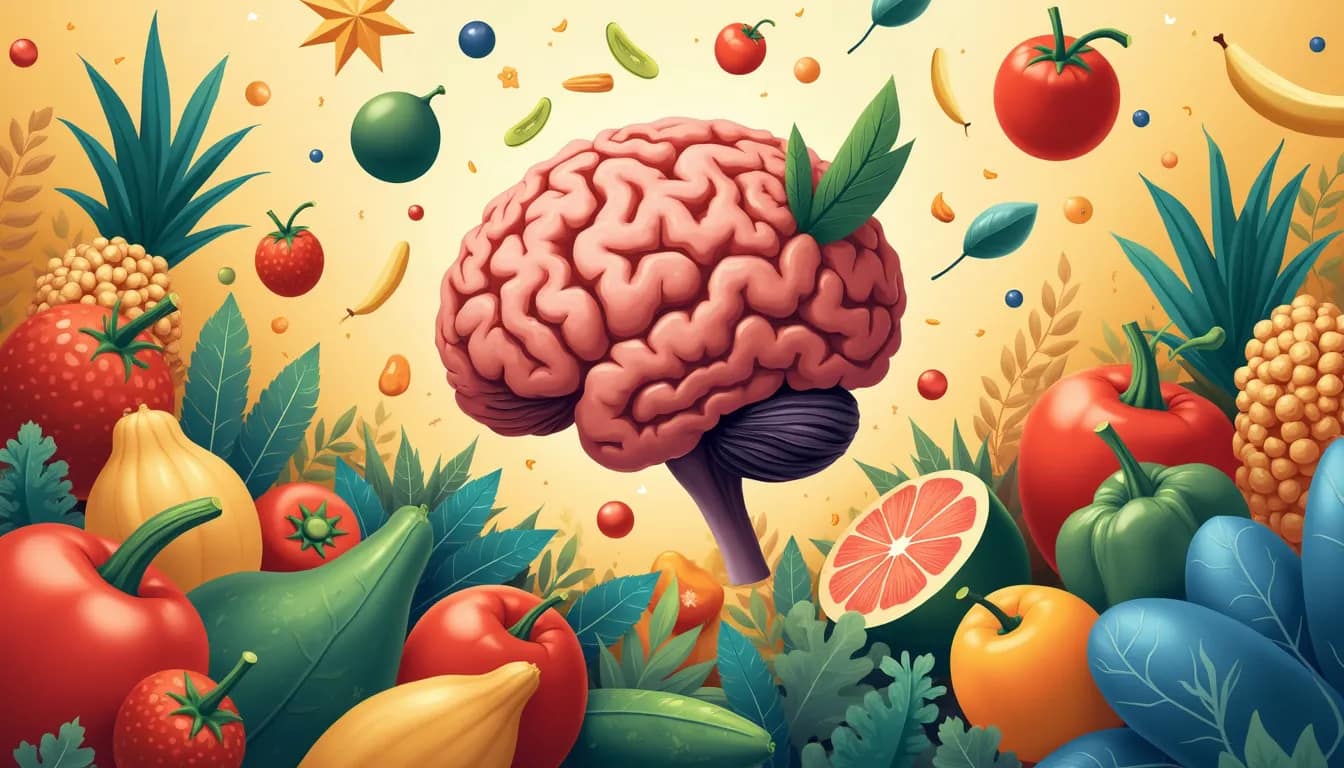In recent years, there has been a growing awareness of the importance of mental health and its profound impact on our overall well-being. While therapy, medication, and mindfulness practices have traditionally garnered much of the attention in mental health discussions, an emerging body of research highlights an essential and often overlooked component: nutrition. The food we consume doesn’t just fuel our bodies; it plays a crucial role in shaping our mental health and emotional stability. Understanding the interrelationship between diet and mental well-being can empower us to make more informed choices that nourish both our minds and bodies. As we navigate this connection, it becomes evident that what we eat can significantly influence our cognitive functions, moods, and overall mental resilience. Exploring the importance of nutrition in mental health is not just about adding another layer to our self-care regimen. It’s about recognizing that the path to a healthier mind may very well begin on our plates.
In recent years, there has been a growing awareness of the crucial role mental health plays in our overall well-being. More people are beginning to understand that mental health is just as important as physical health, and that maintaining a balance in both areas is essential for a fulfilling life. One of the areas garnering significant attention is the interrelationship between diet and mental well-being. This connection highlights how what we eat can significantly impact our mental health and overall quality of life.
The field of nutritional psychiatry is emerging, focusing on how nutrient intake can affect mental health. Researchers have found that certain dietary choices can help manage and even prevent symptoms of mental health conditions such as depression and anxiety. It’s becoming increasingly important for individuals to be mindful of their nutritional habits and understand how they correlate with their mental wellness.
Understanding the impact of nutrition on mental health can empower us to make informed choices that enhance both our physical and mental states. Proper nutrition serves as fuel for our brain, the central control of our emotions and cognitive functions. Therefore, by nourishing our bodies with the right nutrients, we are also nurturing our minds.
Scientific research supports the notion that a healthy diet can lead to a healthier mind. For example, studies have shown that unhealthy eating patterns, such as those high in processed and sugary foods, are linked to the development of mood disorders, whereas a nutritious diet rich in fruits, vegetables, lean proteins, and whole grains can support mental clarity and emotional stability.
Moreover, considering the biochemical processes of our bodies provides a deeper understanding of how nutrition affects mental health. Certain foods can influence hormone levels, neurotransmitter function, and brain structure, all of which play critical roles in our mood and mental health. By embracing a wholesome diet, we are not only taking care of our bodies but also promoting a healthier, more balanced mind.
Another dimension of the diet-mental health connection is the association between gut health and mental well-being. The gut-brain axis is a complex communication network linking the gut and the brain. Poor dietary habits can disrupt the balance of beneficial gut bacteria, leading to inflammation and negatively impacting mental health. Conversely, a diet rich in probiotics and fiber can help maintain a healthy gut microbiome, which is vital for mood regulation and cognitive functions.
It’s important to acknowledge that the relationship between nutrition and mental health is not one-size-fits-all. Each person’s body reacts differently to dietary changes due to genetic, environmental, and lifestyle factors. Nonetheless, recognizing the profound connection between what we eat and our mental well-being can motivate us to make healthier choices with a holistic view of health.
By making small, consistent changes to our diet, we can significantly enhance our mental health. Simple actions like incorporating a variety of colorful vegetables, choosing whole grains over refined ones, and staying hydrated can make a noticeable difference in how we feel mentally and emotionally. As we become more aware of the foods that support our mental health, we can create a sustainable and enjoyable approach to eating that benefits both our body and mind.
With the growing body of research, it’s clear that taking the time to learn about and implement better eating habits is a worthy investment in our mental well-being. The overlap of nutrition and mental health is a reminder that the steps we take towards better physical health invariably contribute to a sound and resilient mind. Embracing this interconnected approach to health ensures that we nurture every facet of our well-being, leading to a more vibrant and fulfilling life.
As we continue exploring this fascinating connection, it becomes evident that nutrition is a powerful tool in managing and improving mental health. It’s an accessible and practical approach that everyone can benefit from, providing us with the means to take control of our mental health through mindful and informed dietary choices. Let us embark on this journey towards better mental health by embracing the nourishment that nature offers and recognizing the profound impact that our dietary habits can have on our minds.
The Connection Between Nutrition and Mental Health
Key Nutrients for Mental Health
As we delve into the intricacies of nutrition’s impact on mental health, it’s essential to highlight key nutrients that play pivotal roles in enhancing brain function and emotional well-being. Let’s explore these critical components and how they contribute to a healthier, more balanced mind.
Essential Vitamins and Minerals for Brain Function
Our brains thrive on a delicate balance of vitamins and minerals that bolster cognitive function and support overall mental health. Among these:
- B-Vitamins: B-vitamins, including B6, B9 (folate), and B12, are vital for producing neurotransmitters such as serotonin, dopamine, and GABA, which modulate mood and stress responses. Research indicates that adequate levels of B-vitamins can reduce the risk of depression and anxiety.
- Omega-3 Fatty Acids: Omega-3s, particularly EPA and DHA, are fundamental for brain structure and function. These fatty acids have been linked to reduced symptoms of depression and anxiety, owing to their anti-inflammatory properties and ability to support synaptic plasticity and connectivity.
Including foods like leafy greens, eggs, fish, and fortified cereals can be a simple yet effective way to ensure you obtain these crucial nutrients regularly.
The Role of Antioxidants in Reducing Oxidative Stress and Mental Health
Oxidative stress occurs when there is an imbalance between free radicals and antioxidants in your body, leading to cellular damage. This imbalance is associated with numerous mental health conditions, including depression and schizophrenia. Antioxidants help neutralize free radicals, thereby protecting brain cells from degeneration and dysfunction.
Consider these antioxidant-rich foods:
- Vitamin E: Found in nuts, seeds, and green leafy vegetables, vitamin E is a potent antioxidant that helps shield your brain cells from oxidative stress.
- Vitamin C: Citrus fruits, berries, and bell peppers are excellent sources of vitamin C, which is crucial for the synthesis of neurotransmitters and the protection of neurons.
- Polyphenols: Abundant in fruits, vegetables, tea, and coffee, polyphenols are micronutrients with antioxidant properties that can reduce inflammation and promote brain health.
Incorporating a colorful array of fruits and veggies into your meal plan can make a significant difference in protecting your mental well-being from the adverse effects of oxidative stress.
Impact of Gut Health and Probiotics on Mood and Emotional Stability
There’s a growing body of research supporting the gut-brain axis theory, which highlights the communication between the gastrointestinal tract and the brain. Emerging evidence suggests that gut health profoundly influences mood, cognition, and even behavior. Simply put, a happy gut often means a happier mind.
Probiotics, the beneficial bacteria in your gut, play a role in producing neurotransmitters such as serotonin. Consequently, maintaining a healthy balance of gut flora can positively impact your mental health. Here’s how you can support your gut:
- Probiotic-rich Foods: Include foods like yogurt, kefir, sauerkraut, kimchi, and other fermented foods in your diet. These provide live bacteria that can help increase the beneficial bacteria in your gut.
- Prebiotics: Foods high in fiber, such as garlic, onions, leeks, and bananas, feed the good bacteria and support their growth and activity in the gut.
In addition to dietary sources, probiotic supplements can be a helpful adjunct to support gut health, but always consult with a healthcare provider before starting any supplements.
Reflecting on these essential nutrients and their roles in mental health can be both enlightening and motivating. Why not take a moment to consider your last meal? Did it include some B-vitamins, Omega-3s, antioxidants, or probiotics? If not, take a deep breath and know that each meal is an opportunity to nourish your body and mind. Small changes can lead to significant improvements in your mental well-being, one bite at a time.
Dietary Strategies for Optimizing Mental Health
Nourishing your mind starts with what you put on your plate. Eating a balanced diet is crucial in supporting mental health, as the right foods can enhance your mood, increase your energy levels, and improve overall cognitive function. Here, we delve into effective dietary strategies for optimizing mental health, including specific diets and practical tips for incorporating nutrient-rich foods into your daily meals.
Recommendations for a Balanced Diet to Support Mental Health
A balanced diet includes a variety of foods that provide the essential nutrients your brain needs to function optimally. Here are some key recommendations:
- Include plenty of fruits and vegetables: Aim for a rainbow of colors on your plate. Fruits and vegetables are packed with essential vitamins, minerals, and antioxidants that support brain function.
- Choose whole grains over refined grains: Whole grains such as brown rice, quinoa, and oats provide a steady release of energy, preventing mood swings and maintaining mental clarity.
- Incorporate healthy fats: Sources of healthy fats like avocados, nuts, seeds, and olive oil are vital for brain health, improving mood and cognitive function.
- Stay hydrated: Dehydration can lead to confusion and irritability. Aim to drink at least 8 glasses of water a day.
- Limit sugar and processed foods: High sugar and processed foods can lead to energy crashes and negatively impact your mood.
Specific Diets and Their Mental Health Benefits
Several specific diets have been found to provide substantial mental health benefits. Two of the most notable are the Mediterranean diet and plant-based diets:
Mediterranean Diet
The Mediterranean diet emphasizes whole, natural foods such as fruits, vegetables, whole grains, beans, nuts, seeds, and olive oil. Research has shown that this diet can significantly reduce the risk of depression and anxiety. The diet is rich in Omega-3 fatty acids, antioxidants, and fiber which are known to support brain health and improve mood.
One study published in the European Journal of Nutrition found that individuals who adhered to a Mediterranean diet had a lower risk of developing depressive symptoms. By following this diet, you nourish your brain with the foods it needs to thrive.
Plant-Based Diet
A plant-based diet focuses on foods derived from plants, including vegetables, nuts, seeds, oils, whole grains, legumes, and fruits. This diet is naturally high in nutrient-dense foods that support mental health. The abundance of vitamins, minerals, and antioxidants found in plant-based diets can reduce inflammation and oxidative stress, both linked to mental health disorders.
According to a study in Frontiers in Nutrition, individuals who adhere to a plant-based diet reported lower levels of anxiety and depression compared to meat-eaters. Embracing a plant-based lifestyle can be a powerful step toward improving mental well-being.
Practical Tips for Incorporating Nutrient-Rich Foods into Daily Meals
Incorporating nutrient-rich foods into your daily meals doesn’t have to be complicated. Here are some practical tips to help you get started:
- Start your day with a nutritious breakfast: Kickstart your day with a breakfast that’s high in protein and fiber, such as a smoothie with spinach, berries, and a scoop of protein powder, or overnight oats topped with nuts and seeds.
- Plan your meals ahead: Meal planning ensures you have the ingredients you need to make healthy choices. Dedicate time each week to plan your meals and prepare your shopping list.
- Snack smart: Choose snacks that are high in nutrients, such as carrots with hummus, a handful of nuts, or a piece of fruit with a small amount of nut butter.
- Make veggies the star of your meal: Fill half your plate with vegetables at both lunch and dinner. Experiment with different ways to prepare them, such as roasting, steaming, or grilling.
- Stay consistent: Consistency is key. Make gradual changes and stick to them. Over time, these small adjustments will lead to big improvements in your mental health.
Taking steps towards a balanced diet can have profound impacts on your mental well-being. Challenge yourself to integrate these tips into your life and observe the positive changes in your mood and mind.
In conclusion, it is becoming increasingly clear that the foods we consume play a significant role in influencing our mental health. The growing body of research underscores the interrelationship between nutrition and mental well-being, emphasizing the importance of a balanced diet rich in essential vitamins, minerals, and other nutrients. Key components such as B-vitamins, Omega-3 fatty acids, and antioxidants are crucial in supporting brain function and reducing oxidative stress, which can positively impact our emotional and psychological stability.
Additionally, gut health is intricately connected to mood regulation, with probiotics demonstrating promising effects on emotional well-being. The connection between our gut and brain reinforces the idea that our dietary choices can have profound implications on our mental health.
Dietary strategies that promote mental well-being include adopting balanced eating habits that can be found in diets like the Mediterranean and plant-based diets. These dietary patterns are abundant in fruits, vegetables, whole grains, and healthy fats, all of which contribute to a healthier mind. Incorporating nutrient-rich foods into daily meals can be achieved through simple yet effective tips, such as consuming a variety of colorful fruits and vegetables, opting for whole grains over refined ones, and including sources of healthy fats like nuts, seeds, and fish.
Ultimately, understanding and prioritizing nutrition can lead to a significant improvement in both our mental and physical health. By making mindful choices about what we eat, we empower ourselves to foster a more balanced, harmonious, and healthy life. Embracing these nutritional changes not only nurtures our body but also supports our journey towards optimal mental wellness.



